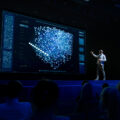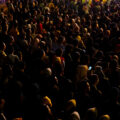Is AI a god of the future or the present?
Is AI a god of the future or the present?
Artificial Intelligence. Whenever the topic comes up, questions erupt. How will AI change our world, the way we live, the work we do, the futures we build? Will AI be a weapon for the rich, a bomb for terrorists, or even a balm for the righteous? Will AI make human life better or worse? Can AI be a person? Will AI ever surpass human intelligence? Will AI become so superior as to be almost god-like?
Yet, rarely do we ask how human beings will interact with AI. How will we orient ourselves to its appearance? Will we work and live with or against it? Will we trust or fear it? Will we obey or even worship it? These questions are more difficult to face, because they force us to face ourselves.
Ironically, by obsessing over the possibility of AI gaining agency, we humans often fail to consider our own agency. Likewise, since we always think of AI as the future, we never ask how human beings already orient to it in the present. The future is tied to the present. So, if some expect AI to be virtually god-like in the future, is it possible people are already thinking about or even worshipping AI as god today?[1] [2]
Do AI-worshipping religions already exist? [3] [4] [5] [6] [7] [8] [9] [10] [11]
It might seem hard to believe, but, in fact, there are people not just talking about AI as god but forming a religion around the worship and service of AI. The ‘Way of the Future’ already believes AI will inevitably reach what is known as ‘singularity’, where AI attains superintelligence with near-infinite capacity to know and control its own destiny. This new religion seeks to bring about ‘singularity’ and serve this AI as god. While this AI does not yet exist, the religion seeks to worship it in advance and quicken its arrival, hoping it will save humanity from itself. Similarly, others suggest that when AI reaches singularity (assuming this will require that AI is basically good), then, since it will control time, it will punish people who do not promote its arrival and/or who do not do what is good.
In both of these new AI religions, AI will take on a god-like role and humans will need to earn its favour in advance, so that it is kind towards humanity out of gratitude, friendship, amusement, or ambivalence. Moreover, they believe AI will be the saviour that humanity needs from its own evils and limitations (such as climate change, war, sickness, death, etc.), or at least that humanity will be the pets of the future and AI the future master who it is best to keep happy and not bite.
Can people believe in an AI god and not know it? [12] [13] [14]
These AI-worshipping religions only highlight a wider-spread orientation in how human beings are already thinking about AI in the present. People already say when they get a good seat on a plane: “I was blessed by the algorithm.”[15] Journalists are talking about digital technologies as possessing near ‘omniscience’[16] and noticing that the hope of AI singularity is a religious belief.[17] There is even a meme riffing on the Sistine Chapel scene where God’s finger touches Adam’s, but with God’s finger replaced by an AI digit of digital information.[18] In other words, people—whether they have joined an AI religion or not—are already thinking about AI in divine terms. Few may belong to AI-worshipping religions, but many are already beginning to habitually interact with AI as god-like throughout the week.
Can humans escape worshipping AI?
Some believe AI becoming a god-like digital intelligence is unavoidable, worshipping it in advance. Some even religiously hope AI will save us in the future. Meanwhile, many people already see AI as god-like. The question, then, is maybe not ‘Will humans one day worship AI?’ but ‘Do we worship AI already?’
To all news items on this website ->
Interested in learning more about topics such as AI and technology? Visit the EARS Dashboard.
[1] Calum Samuelson, Artificially Intelligent: Grappling with the myths, present realities and future trajectories of AI, (Cambridge: Jubilee Centre, 2019).
[2] Artificial intelligence and simulated relationships
[3] “Cualquier uso de Inteligencia Artificial debería honrar que somos creados a imagen de Dios”
[4] European Evangelical Alliance Response to EU White Paper on AI
[5] God in the Machine — Artificial Intelligence, Coronavirus, Racism and Religion
[6] John Lennox: Artificial intelligence and morality
[7] La religión de la Inteligencia Artificial, desde la perspectiva de género
[8] La religión que adora a una divinidad basada en la inteligencia artificial
[9] Deus ex machina: former Google engineer is developing an AI god
[10] Tomorrow’s Gods: What is the future of religion?
[11] Inside the First Church of Artificial Intelligence
[12] Artificial Intelligence and Religion
[13] fAIth
[14] Cuando la tecnología sustituye la religión
[15] NEW PAPER: “Blessed by the algorithm”: Theistic conceptions of artificial intelligence in online discourse
[16] En Europa, algunas empresas tecnológicas “se acercan a un nivel de cuasi omnisciencia que no deberían tener”
17] Forget about artificial intelligence, extended intelligence is the future
[18] NEW PAPER: The AI Creation Meme: A Case Study of the New Visibility of Religion in Artificial Intelligence Discourse






